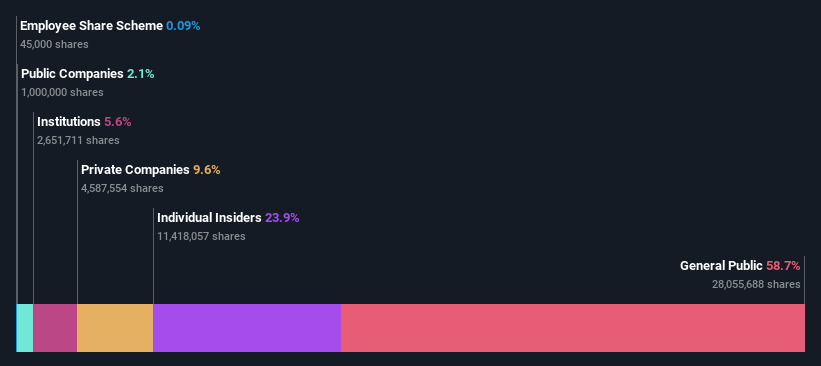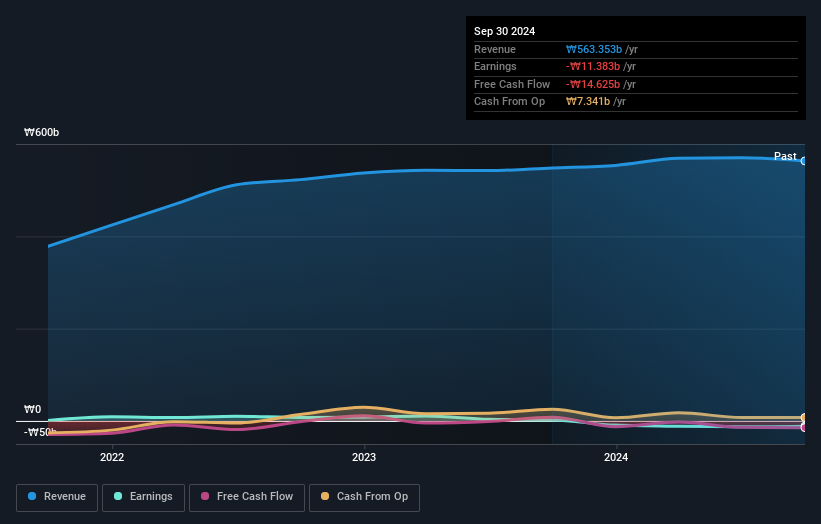- South Korea
- /
- Building
- /
- KOSDAQ:A109610
Sy Co., Ltd.'s (KOSDAQ:109610) market cap up ₩48b last week, benefiting both individual investors who own 59% as well as insiders

Key Insights
- Significant control over Sy by individual investors implies that the general public has more power to influence management and governance-related decisions
- A total of 10 investors have a majority stake in the company with 41% ownership
- Insiders own 24% of Sy
Every investor in Sy Co., Ltd. (KOSDAQ:109610) should be aware of the most powerful shareholder groups. With 59% stake, individual investors possess the maximum shares in the company. That is, the group stands to benefit the most if the stock rises (or lose the most if there is a downturn).
Following a 27% increase in the stock price last week, individual investors profited the most, but insiders who own 24% stock also stood to gain from the increase.
In the chart below, we zoom in on the different ownership groups of Sy.
Check out our latest analysis for Sy

What Does The Institutional Ownership Tell Us About Sy?
Many institutions measure their performance against an index that approximates the local market. So they usually pay more attention to companies that are included in major indices.
As you can see, institutional investors have a fair amount of stake in Sy. This implies the analysts working for those institutions have looked at the stock and they like it. But just like anyone else, they could be wrong. If multiple institutions change their view on a stock at the same time, you could see the share price drop fast. It's therefore worth looking at Sy's earnings history below. Of course, the future is what really matters.

Sy is not owned by hedge funds. With a 18% stake, CEO Young-Don Hong is the largest shareholder. With 9.6% and 5.5% of the shares outstanding respectively, Sy Tech Co. Ltd and Ok-Joo Kim are the second and third largest shareholders.
On studying our ownership data, we found that 10 of the top shareholders collectively own less than 50% of the share register, implying that no single individual has a majority interest.
While studying institutional ownership for a company can add value to your research, it is also a good practice to research analyst recommendations to get a deeper understand of a stock's expected performance. We're not picking up on any analyst coverage of the stock at the moment, so the company is unlikely to be widely held.
Insider Ownership Of Sy
The definition of company insiders can be subjective and does vary between jurisdictions. Our data reflects individual insiders, capturing board members at the very least. The company management answer to the board and the latter should represent the interests of shareholders. Notably, sometimes top-level managers are on the board themselves.
I generally consider insider ownership to be a good thing. However, on some occasions it makes it more difficult for other shareholders to hold the board accountable for decisions.
Our information suggests that insiders maintain a significant holding in Sy Co., Ltd.. Insiders have a ₩44b stake in this ₩183b business. This may suggest that the founders still own a lot of shares. You can click here to see if they have been buying or selling.
General Public Ownership
The general public, who are usually individual investors, hold a substantial 59% stake in Sy, suggesting it is a fairly popular stock. With this amount of ownership, retail investors can collectively play a role in decisions that affect shareholder returns, such as dividend policies and the appointment of directors. They can also exercise the power to vote on acquisitions or mergers that may not improve profitability.
Private Company Ownership
It seems that Private Companies own 9.6%, of the Sy stock. It might be worth looking deeper into this. If related parties, such as insiders, have an interest in one of these private companies, that should be disclosed in the annual report. Private companies may also have a strategic interest in the company.
Next Steps:
I find it very interesting to look at who exactly owns a company. But to truly gain insight, we need to consider other information, too.
I like to dive deeper into how a company has performed in the past. You can find historic revenue and earnings in this detailed graph.
Of course this may not be the best stock to buy. Therefore, you may wish to see our free collection of interesting prospects boasting favorable financials.
NB: Figures in this article are calculated using data from the last twelve months, which refer to the 12-month period ending on the last date of the month the financial statement is dated. This may not be consistent with full year annual report figures.
New: Manage All Your Stock Portfolios in One Place
We've created the ultimate portfolio companion for stock investors, and it's free.
• Connect an unlimited number of Portfolios and see your total in one currency
• Be alerted to new Warning Signs or Risks via email or mobile
• Track the Fair Value of your stocks
Have feedback on this article? Concerned about the content? Get in touch with us directly. Alternatively, email editorial-team (at) simplywallst.com.
This article by Simply Wall St is general in nature. We provide commentary based on historical data and analyst forecasts only using an unbiased methodology and our articles are not intended to be financial advice. It does not constitute a recommendation to buy or sell any stock, and does not take account of your objectives, or your financial situation. We aim to bring you long-term focused analysis driven by fundamental data. Note that our analysis may not factor in the latest price-sensitive company announcements or qualitative material. Simply Wall St has no position in any stocks mentioned.
About KOSDAQ:A109610
Sy
Engages in the production and sale of architectural materials for buildings in South Korea.
Acceptable track record with mediocre balance sheet.
Market Insights
Community Narratives





